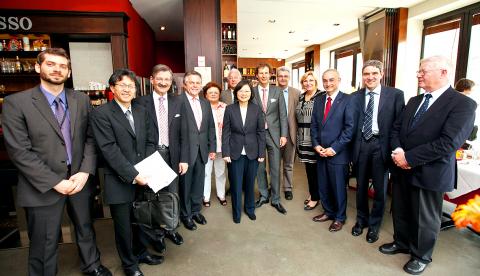|
Tsai talks
¡¥nuclear-free homeland¡¦
BERLIN BUSINESS: The DPP chairperson discussed
alternative energy options and cross-strait issues when she met with German
lawmakers and policymakers
By Vincent Y. Chao / Staff Reporter

Democratic Progressive Party
Chairperson and presidential candidate Tsai Ing-wen, center, meets members of
the Germany-Taiwan Parliamentary Friendship Group in Berlin, Germany, on
Tuesday.
Photo: Ccourtesy of the DPP
Senior German policymakers have reportedly
expressed support for Democratic Progressive Party (DPP) Chairperson Tsai
Ing-wen¡¦s (½²^¤å) initiative to phase out nuclear power by 2025 in Taiwan in favor
of more sustainable energy.
A statement given by the DPP, which could not be independently verified, said
that German lawmaker Hans-Josef Fell, a key author of a renewable energy law,
met with Tsai on Tuesday in Berlin to discuss her ¡§2025 nuclear-free homeland¡¨
plan.
¡§The two sides exchanged opinions on Germany¡¦s energy and nuclear-free policies.
Fell expressed high recognition of Tsai¡¦s [proposal] and believes that the whole
world will look toward Taiwan if it were to progress toward this target,¡¨ the
DPP statement read.
¡§Fell said the anti-nuclear movement has become the trend after the Fukushima
Dai-ichi nuclear power plant incident,¡¨ the statement said.
The DPP said the German experience represented a ¡§big encouragement¡¨ that would
be considered for future policy in Taiwan.
¡§The German government has showed leadership abilities over the past decade to
support sustainable energy through its policies. As a result, renewable energy
sources today account for 17 percent of its power needs, among the world¡¦s
highest,¡¨ the DPP said.
The DPP¡¦s presidential candidate was said to have noted that Germany¡¦s
sustainable energy policies have since created more than 370,000 jobs,
suggesting that a similar feed-in tariff scheme could do the same to Taiwan.
The ¡§2025 nuclear-free homeland¡¨ is Tsai¡¦s first major policy initiative since
announcing she would run for president.
It aims to prevent commerial operations after the completion of the Fourth
Nuclear Power Plant and to not renew the licenses for the three plants now in
operation, pending the development of other renewable sources.
Government officials have said the plan represents a flip-flop for Tsai, because
she had once supported the Fourth Nuclear Power Plant.
DPP officials accompanying Tsai on her trip to Germany and the UK also said that
she met with German lawmakers belonging to a ¡§Taiwan caucus¡¨ as well as the
German Council on Foreign Relations, a prominent think tank staffed with retired
policymakers.
Tsai was said to have told the politicians that cross-strait issues concerned
not just Taiwan and that Taiwan should stand side-by-side with the international
community when it came to dealing with Beijing.
¡§Taiwan should base the framework for cross-strait interactions on its relations
with the rest of the world. This method will avoid falling into a political trap
that will see [Taiwan] trade political concessions for economic benefits,¡¨ a DPP
transcript of the meeting quotes Tsai as saying.
On Tuesday evening, Tsai told a gathering of Taiwanese expatriates that she
believed the DPP and the Chinese Nationalist Party (KMT) were locked in a very
close race for next year¡¦s presidential and legislative elections.
Both parties have grassroots support of 6 million voters and backing from 1
million to 1.5 million undecided voters, who will be key to victory next year,
she said in comments recorded by local media.
|
![]()
![]()
![]()